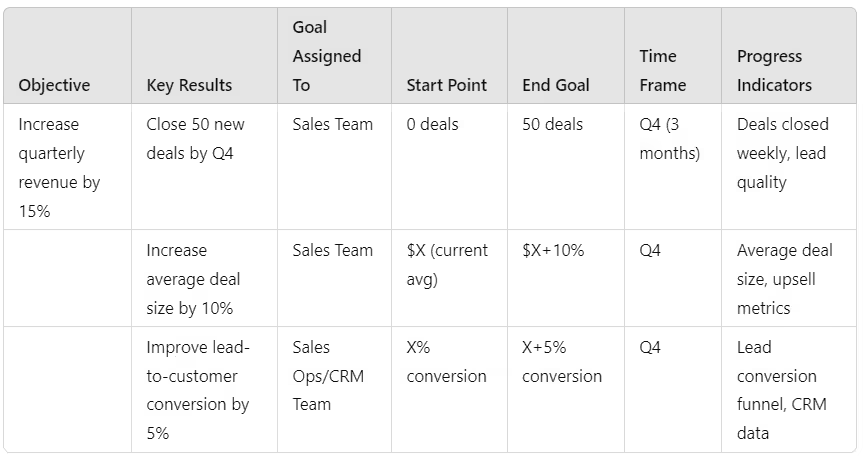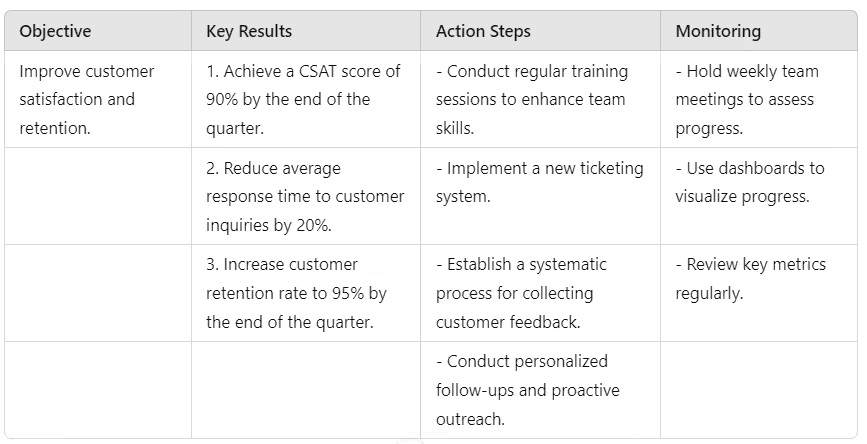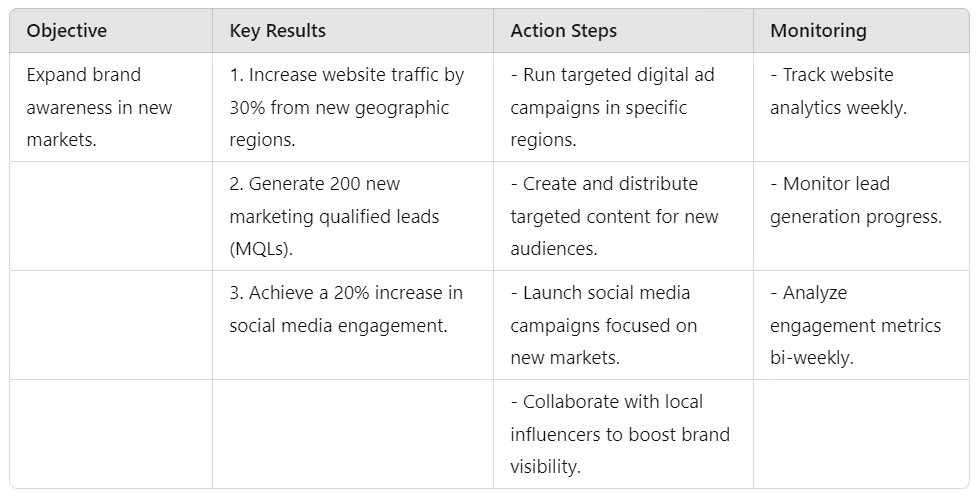OKR is an acronym for “objectives and key results.” It is a popular framework that helps companies set goals, measure progress, and grow faster. First introduced by Andy Grove at Intel, they have since been widely used by fast-growing startups.
Other than that, OKRs can also be used for setting goals in various areas, whether it’s office work, software development, nonprofits, or other industries. OKRs help businesses figure out their top priorities, set clear goals, and make sure teams are working toward the same objectives.
OKRs (Objectives and Key Results) help answer several critical questions for organizations, including:
- What are our key objectives?
- How will we measure success?
- Are we making progress toward our goals?
- Are teams aligned in their efforts?
- What should we prioritize to achieve growth?
The OKR system is simple but effective, helping businesses focus on their key goals and track performance. It also encourages teamwork across different departments. However, despite how useful they are, many companies still find it hard to implement OKRs properly. In this blog, we’ll explore how tools like ChatGPT can help improve the OKR process.
Table of Contents
1. The History of OKRs
OKRs started in 1970 when Andy Grove, then CEO of Intel, created the framework to help the company stay focused and aligned. Since then, big companies like Google, LinkedIn, and Twitter have used it because of how simple and flexible it is.
The beauty of OKRs lies in their simplicity.
They focus on a few key goals and tie them to measurable results, which helps companies stay focused on what matters most and track their progress. But even though OKRs are simple, many companies still struggle to use them well.
2. Why Do Companies Fail to Implement OKRs Effectively?
Even though OKRs are meant to be simple, many companies still find them hard to use effectively. Here’s why it often doesn’t work out:
- Treating OKRs as Just a Tool: Companies sometimes see OKRs as a quick fix instead of a long-term practice that needs regular attention and updates. Without this discipline, it’s hard to stay focused and get the results you want.
- Not Tracking Progress: To keep OKRs on track, you need to check in regularly. If companies don’t follow through with reviews and updates, they can lose sight of their main goals.
- Vague OKRs: Writing good OKRs isn’t always easy. Many companies end up with unclear objectives that aren’t specific or measurable, making it hard to know what success looks like.
- Misaligned Key Results: The goals you set need to be tied to the right metrics. If the key results don’t match up with your objectives, progress will be difficult to measure and achieve.
- Lack of Team Collaboration: OKRs are designed to encourage teamwork across different departments. But if teams aren’t communicating well, the goals can get lost in the shuffle, making them less effective.
3. How to Solve The Common OKR Challenges?
In the past, many companies have hired consultants to help them set up and manage their OKRs. While consultants can bring valuable expertise, the process of creating and managing OKRs can be complex and take a lot of time.
It also requires a good understanding of the company’s history and goals, which can make the process even more challenging.
But now, generative AI, tools like ChatGPT, can make things easier by:
- Speeding up OKR creation: ChatGPT can help draft OKRs quickly by generating suggestions based on your company’s goals, making the process faster and less time-consuming.
- Providing helpful insights: ChatGPT can give you advice on how to improve your OKRs or make them clearer, especially when you’re struggling to put ideas into measurable objectives.
- Saving time: Instead of starting from scratch or needing outside help, ChatGPT can act like your assistant, allowing you to focus on fine-tuning rather than spending too much time on the basics.
4. How Can Generative AI Help with OKRs?
Generative AI, like ChatGPT, can help solve some common problems that companies face with OKRs.
At DAiOM, we’ve done several tests to see how AI can assist in writing and tracking OKRs. We found that AI, especially ChatGPT, can be a valuable tool for improving OKRs.
ChatGPT has access to a lot of knowledge about OKRs, such as best practices, successful examples, and details specific to different industries. ChatGPT has helped us create well-written OKRs, suggest key performance indicators (KPIs), and give advice on how to track and maintain progress.
Here’s how you can use AI to improve your OKRs:
- Tell ChatGPT about your company and role: Give ChatGPT some basic information about your company and your role so it can suggest OKRs that are more relevant to your situation.
- Set clear objectives: Clearly state your main goals. ChatGPT can suggest objectives that fit your industry and are aligned with your company’s long-term plans.
- Get sample OKRs: Based on what you’ve shared, ChatGPT can generate sample OKRs for different departments like sales, marketing, or customer service.
- Fine-tune your OKRs: You can edit the suggested OKRs to make sure they’re clear, measurable, and actionable. ChatGPT can help refine them to better fit your goals.
- Track and adjust the results: AI can also help you keep track of your OKRs, making adjustments as needed to stay on the right path and make decisions based on data.
5. Sample OKRs for Different Departments
To give you an idea of how ChatGPT can help, here are some sample OKRs for different departments:
Sales Department:
We used the following prompt for ChatGPT:
Objective: Increase quarterly revenue by 15%.
Key Results:
- Close 50 new deals by the end of Q4.
- Increase average deal size by 10%.
- Improve conversion rate from lead to customer by 5%.

Customer Service Department:
We used the following prompt for ChatGPT:
Objective: Improve customer satisfaction and retention.
Key Results:
- Increase customer satisfaction score (CSAT) to 90%.
- Reduce average response time to customer inquiries by 20%.
- Retain 95% of customers by the end of the quarter.

Marketing Department:
We used the following prompt for ChatGPT:
Objective: Expand brand awareness in new markets.
Key Results:
- Increase website traffic by 30% from new geographic regions.
- Generate 200 new marketing qualified leads (MQLs).
- Achieve a 20% increase in social media engagement.

6. Conclusion
OKRs are super key to build a data culture in any organization and writing good actionable OKRs is the biggest challenge. By using AI, companies can improve how they set and manage OKRs, leading to better results and a more collaborative and focused work environment. Consider exploring how ChatGPT can assist you in your OKR journey and help you make the most of this effective framework in your organization.
Feel free to try our OKR Copilot (You would require a ChatGPT user id for it, free account will work).
Since this is in beta, would love to hear your feedback and suggestions for improvements.
Subscribe to our NEWSLETTER!
Watch our video to see how Generative AI can take your OKRs to the next level.


